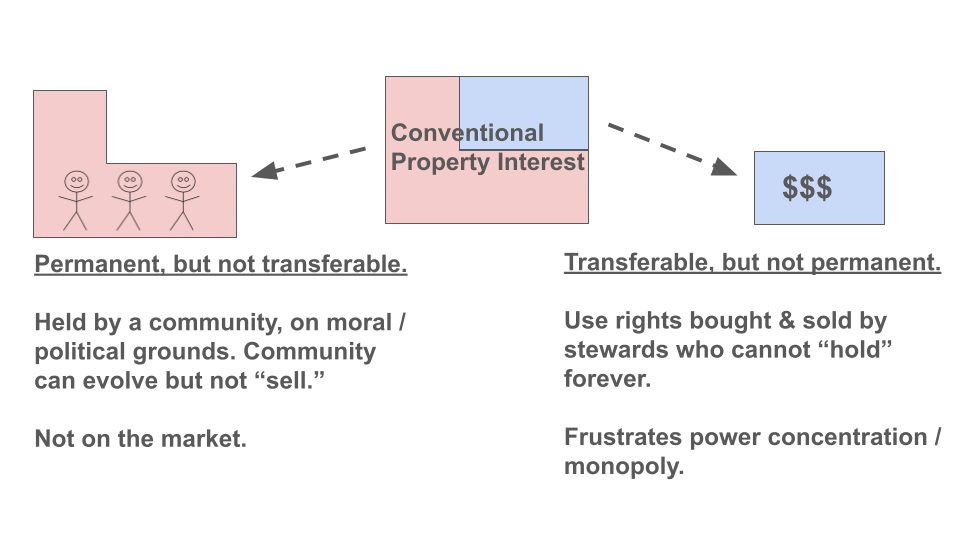Partial Common Ownership
Partial common ownership (also known as PCO, COST, SALSA or Plural Property) is a new way of managing assets that is fairer and more efficient than conventional private property on the one hand; or conventional shared property on the other.
RadicalxChange Foundation is collaborating with Serpentine Arts Technologies (Future Art Ecosystems) and a team of builders to introduce partial common ownership to the culture and practice of artists and their communities. We are building infrastructure for the management of partial common ownership interests and facilitating experiments with this new way of stewarding cultural work (and more). Our inaugural project is with the Aerocene Foundation and the Salinas Grandes communities in Argentina as well as artists selected for the launch of the PCOArt blockchain system.
Partial common ownership addresses a fundamental problem with conventional property interests: the marriage of transferability and permanence.
Transferability gives owners absolute discretion to sell an asset to the highest bidder, and permanence gives owners power over an asset that lasts forever. Coupled together, they create long-lasting power concentrations with negative externalities. Permanent and transferable property rights let power flow out of the social contexts that generate value, leading to fragmentation and growing economic asymmetries.
By decoupling permanence from transferability, partial common ownership makes assets less “capital-like” and splits them into separate “bundles of rights”:
The first consists of a license to manage and benefit from the asset for a particular period of time. This is called the stewardship license and can be bought and sold through auctions at periodic intervals. The duration of the license may vary but at the end of it, a steward must always auction the asset—thereby it is a transferable but not permanent right.

The second “bundle of rights” consists of the PCO residual – enduring privileges acknowledging and empowering the living community that animates the asset. This is typically held by a community in perpetuity, on moral or political grounds. The community can evolve with changing membership, but the rights cannot be sold on the market. These rights include revenue streams that flow from the temporary licenses, as well as certain governance decisions.
Most calls to rethink capitalism do not ask questions about the basic structure of property rights. Instead, they seek to either divide and fractionalize ownership (i.e. give more or different people a share of conventional ownership) or consolidate ownership (i.e. place it in the hands of some representative of the public, like the state).
Yet fractionalized ownership doesn’t specify who should manage the asset at any point in time, or how to avoid a tragedy of the commons scenario; while consolidated ownership runs the perennial risk of institutional dysfunction and illegitimate representation of stakeholders. Partial common ownership provides a third way. A model where an asset is more fluidly held between a public (owners of the residual) and private actors (who can temporarily control the stewardship rights), with incentives set to maximize its productive use.
Learn more on our PCO website, or join the conversation in our active PCO Discord.
Further Reading
Between Abundance and Scarcity - Matt Prewitt
Depreciating Licenses - E. Glen Weyl, Anthony Lee Zhang
Do not design for speculators - Tony Sheng
Does the Henry George Theorem Provide a Practical Guide to Optimal City Size? - Richard Arnott
The Handbook for Radical Local Democracy - Matt Prewitt, Paul Healy
Ownership and Punishment - Matt Prewitt
Progress and Poverty - Henry George
Property Attachments - Lee Anne Fennell
Property in Radical Markets - Katrina Miriam Wyman
Chapter 1 of Radical Markets - Eric A. Posner, E. Glen Weyl
Redesigning Spectrum Licenses to Encourage Innovation and Investment - Paul Milgrom, E. Glen Weyl, Anthony Lee Zhang
Reimagining Property - Matt Prewitt
The ‘Socialism’ of Léon Walras and His Economic Thinking - Renato Cirillo
Tools
Geo Web - Geo Web is a set of open protocols for anchoring digital content (e.g., augmented reality, NFTs, apps, games, etc.) to physical locations. It uses partial common ownership to administer its global digital land market with all proceeds being used to fund public goods. The network runs on the Optimism L2 Rollup.
Eden Network - Eden is a priority transaction network that protects traders from frontrunning, aligns incentives for block producers, and redistributes miner extractable value by allocating Ethereum blockspace with Harberger taxation.
Harberger Ads - Harberger Ads is an advertising marketplace governed by the rules of SALSA. Bootstrapped in a hackathon, the application allows you to sell ad space on your site or to possess other people’s ad spaces. In its current version, Harberger Ads runs on Ethereum’s test network.
Nonomos - Nonomos is a pilot application on Ethereum’s Rinkeby test network that by means of SALSA, governs the rights to cast YouTube videos on the associated site nonomos.com. Beyond that, it lets you mint and interact with additional unique tokens that work like SALSA.
Wildcards - Wildcards applies gamification of market powers to fundraising for animal conservation. The “Wildcards” are tokens à la SALSA, which income goes to conservation foundations. The possessors of the tokens, or guardians of the animals, compare their contributions on a leaderboard.
This Artwork Is Always On Sale - TAIAOS is a unique, rare digital artwork that is always on sale along the economic lines of SALSA. The scarcity of the digital artwork, its always-on auction & management of patronage towards the artist is all enabled through blockchain smart contracts on Ethereum.